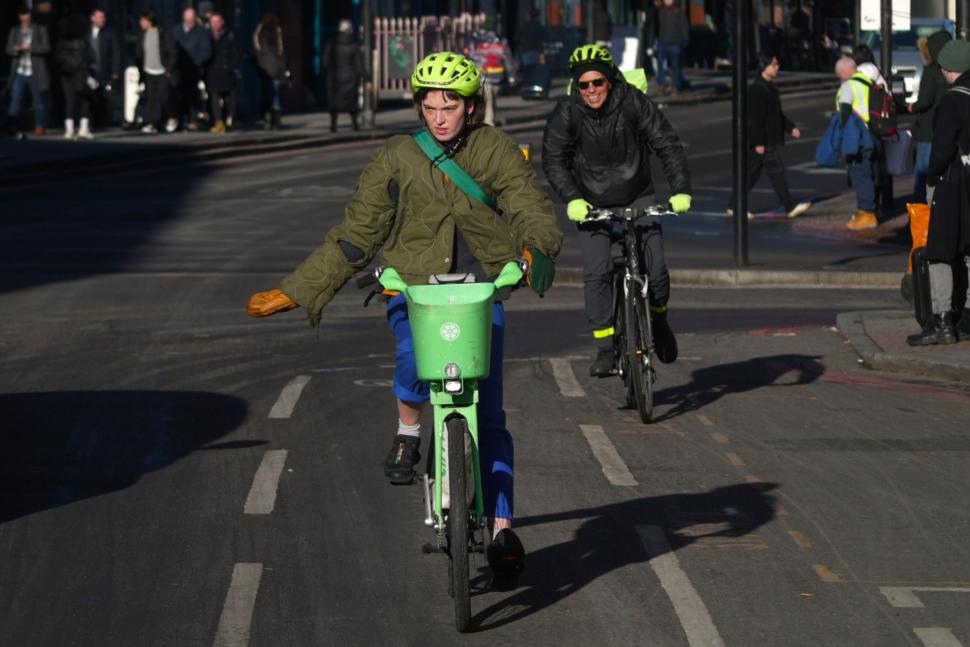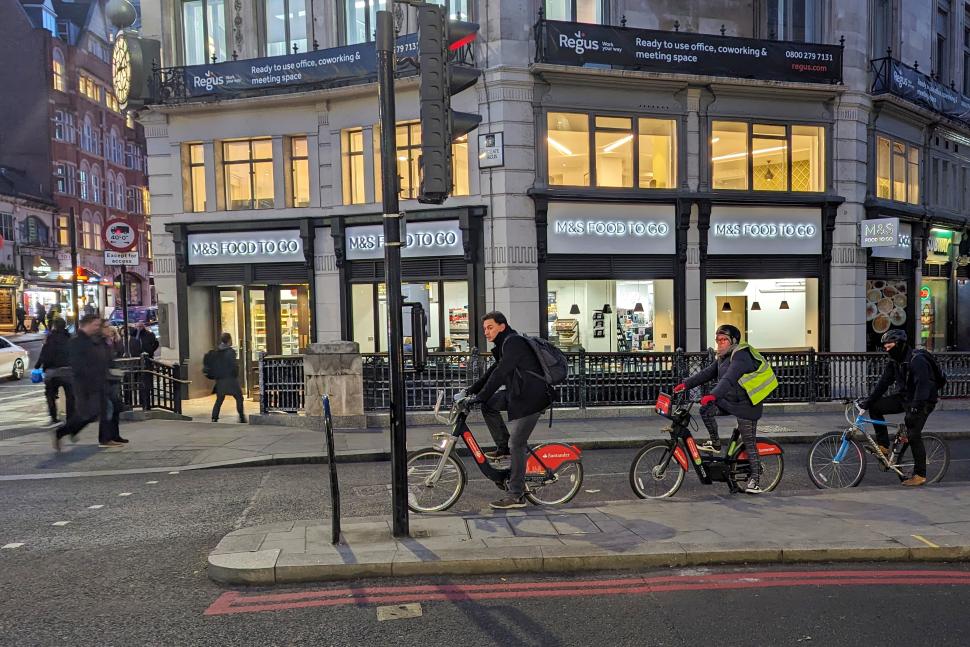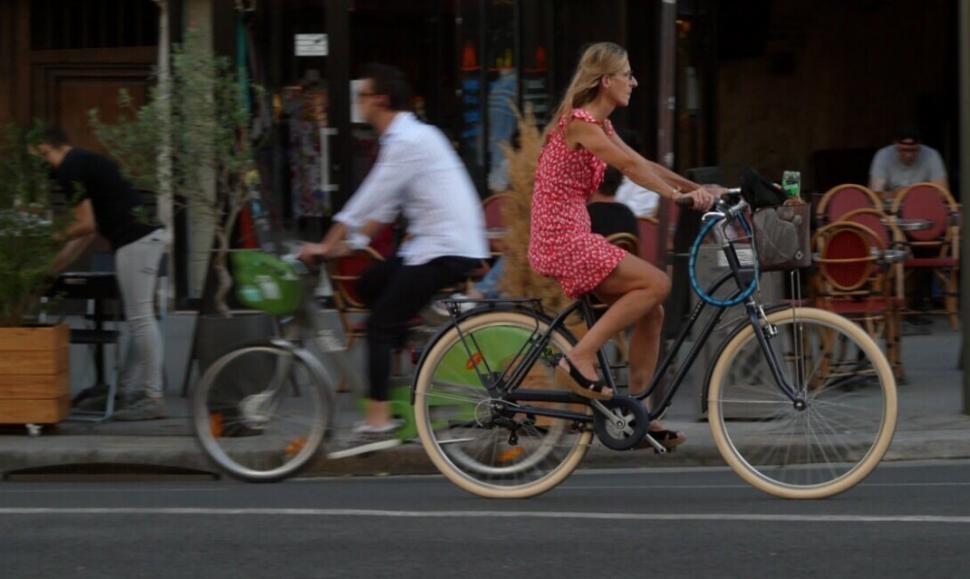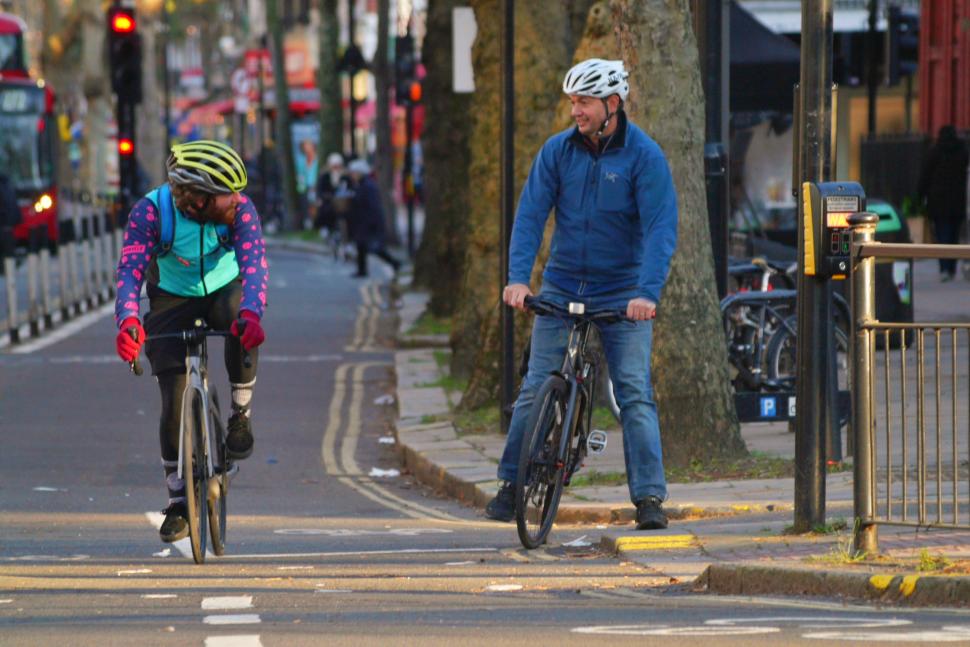- News
- Reviews
- Bikes
- Accessories
- Accessories - misc
- Computer mounts
- Bags
- Bar ends
- Bike bags & cases
- Bottle cages
- Bottles
- Cameras
- Car racks
- Child seats
- Computers
- Glasses
- GPS units
- Helmets
- Lights - front
- Lights - rear
- Lights - sets
- Locks
- Mirrors
- Mudguards
- Racks
- Pumps & CO2 inflators
- Puncture kits
- Reflectives
- Smart watches
- Stands and racks
- Trailers
- Clothing
- Components
- Bar tape & grips
- Bottom brackets
- Brake & gear cables
- Brake & STI levers
- Brake pads & spares
- Brakes
- Cassettes & freewheels
- Chains
- Chainsets & chainrings
- Derailleurs - front
- Derailleurs - rear
- Forks
- Gear levers & shifters
- Groupsets
- Handlebars & extensions
- Headsets
- Hubs
- Inner tubes
- Pedals
- Quick releases & skewers
- Saddles
- Seatposts
- Stems
- Wheels
- Tyres
- Health, fitness and nutrition
- Tools and workshop
- Miscellaneous
- Cross country mountain bikes
- Tubeless valves
- Buyers Guides
- Features
- Forum
- Recommends
- Podcast
 Cyclist in London indicating in cycle lane - copyright Simon MacMichael
Cyclist in London indicating in cycle lane - copyright Simon MacMichaelBetter knowledge of Highway Code changes to protect cyclists and more 20mph speed limits recommended by professor who argues active travel is "best buy" for improving nation's health
A consultant orthopaedic surgeon has made the case for active travel being the "best buy" for improving people's health, publishing a piece in the British Medical Journal (BMJ) arguing that encouraging more cycling and walking journeys should be a priority in the United Kingdom — with better communication of the Highway Code changes designed to protect vulnerable road users, and wider implementation of 20mph speed limits two of her suggestions for helping to "challenge the UK's car dependency and enable active travel for everyone's health".
Professor Scarlett McNally authored the piece published in the BMJ, titled 'Enabling active travel can improve the UK's health', and looked at research around active travel to highlight its health benefits before recommending policy suggestions for bringing about more walking and cycling journeys.
She began by acknowledging the "urgent need to improve the nation's health, which worsened over the pandemic", and noted that an "abundance of evidence and reports" point to exercise being a "miracle cure that improves physical and mental health and reduces demands on NHS services and the need for social care".
"The best forms of exercise are those that fit into everyday life," she continued. "Active travel is a 'best buy' for improving health. Commuting by cycling reduces incidence of, and mortality from, heart disease and cancer by over 30 per cent in a dose dependent manner and reduces sick days and depression."
However, citing Department for Transport statistics which show that 71 per cent of women and 61 per cent of men believe it is too dangerous to cycle on the UK's roads, Prof. McNally suggested the need for segregated safe cycle routes which, when provided, "people use them, as has been demonstrated in Paris".
> Six in ten users of pop-up bike lanes in Paris are new to cycling, says city's government
"In the UK, massive central funds are spent on major roads. Conversely, funds for infrastructure to support active travel are stuck in local council budgets, which are facing a £4bn spending gap," she said before making "four suggestions to support active travel cheaply".
Prof. McNally followed many road safety campaigners and charities, such as Cycling UK, in calling for the Highway Code changes of January 2022, brought in to better protect vulnerable road users, to be better communicated to the public with a "bigger media campaign" about safe overtaking distances, and pedestrian and cyclist priority at junctions.
Secondly, and based on the "horrific injuries I see in orthopaedic and fracture clinics" that get "exponentially worse with every 1 mph increase in speed", she suggested the need to "demand 20 mph limits in all areas where people are".
1/2 A couple of papers for us nerds & some top data:
'Active travel is a “best buy” for improving health. Commuting by cycling reduces incidence of, and mortality from, heart disease and cancer BY OVER 30% Imagine a drug that could do that.
But how....https://t.co/0W7OMH1EBp— Chris Boardman (@Chris_Boardman) March 7, 2024
Looking at the NHS itself, the consultant orthopaedic surgeon argued that the NHS should be "role models" and lead the way on a modal shift from driving to active travel, a transition enabled with pavements in all NHS sites, secure cycle parking, and lockers for wet gear.
"Fourthly, we need to link with other initiatives," she concluded. "Every NHS organisation is required to deliver a 'green plan'. Active travel reduces pollution, which causes catastrophic ill health and harms the planet. Children getting to school under their own steam has huge benefits. Many families cannot afford a second car or live in transport poverty. People being able to get about safely reduces loneliness. Let's challenge the UK's car dependency and enable active travel for everyone's health."
In January, we reported new research published in the International Journal of Epidemiology which found that commuting by bike can improve mental health, with those who cycle to work less likely to be prescribed antidepressants.
"This work suggests that cycle commuting is causally related to reduced mental ill-health and provides further evidence in support of the promotion of active travel to encourage commuters travelling shorter distances to shift to cycle commutes," the University of Edinburgh researchers concluded.
Later in the same month, new research by the Swedish School of Sport and Health Sciences in Stockholm, and published in the British Journal of Sports Medicine, found that boosting cardiorespiratory fitness by three per cent in a year was linked to a 35 per cent lower risk of developing prostate cancer.
Dan is the road.cc news editor and joined in 2020 having previously written about nearly every other sport under the sun for the Express, and the weird and wonderful world of non-league football for The Non-League Paper. Dan has been at road.cc for four years and mainly writes news and tech articles as well as the occasional feature. He has hopefully kept you entertained on the live blog too.
Never fast enough to take things on the bike too seriously, when he's not working you'll find him exploring the south of England by two wheels at a leisurely weekend pace, or enjoying his favourite Scottish roads when visiting family. Sometimes he'll even load up the bags and ride up the whole way, he's a bit strange like that.
Latest Comments
- ubercurmudgeon 4 hours 26 min ago
I had three different cyclocross bikes before the marketing departments at various bicycle companies came up with the "gravel" category. All of...
- Sredlums 5 hours 10 min ago
Maybe the UK could try to reach some sort of agreement with the EU over things like international trade and such.
- David9694 5 hours 40 min ago
Cumbria County Council was a 1974 creation, merging the of old County Borough of Carlisle, and counties of Cumberland, and Westmorland - in which...
- Backladder 5 hours 52 min ago
If BC want to insist on barriers then they should have their own stock loaded on a truck that they can rent out to organisers at reasonable cost,...
- Miller 6 hours 22 min ago
Well, there's lifetime bans and there's lifetime bans. Banning an 88 year old don't impress me much.
- Gkam84 9 hours 27 min ago
I think that is why blind eyes have been turned in the UK, internationally aswell, with things like the Redhook crits, there were many licensed...
- mdavidford 10 hours 36 min ago
Ahem - other esporters(?) might be rather surprised to hear that the UCI has taken over their events - I think that would be the Cycling Esports...
- Bungle_52 10 hours 45 min ago
I wonder how he got to the game?
- OldRidgeback 10 hours 48 min ago
You'd need some good wet weather gear for that ride too.
- OnYerBike 13 hours 12 min ago
It seems to me that the most likely explanation is that whoever provided that quote fails to grasp the difference between a "public right of way"...



Add new comment
163 comments
Yeah - I mean, even America managed to make a patriotic UK bike...
Need more patriotic accessories.
Hang on - why isn't Charles taking a lead? I know some of the kids were pictured about on bikes once or twice (bit awks). But how come some Johnny Foreigners have a cycling king and we don't?
Come now, how could you say this gentleman is not a keen cyclist? Actually I have heard that at Highgrove he insists on his staff cycling around the estate but drives himself around in a Land Rover or his Aston Martin. Which I think even as a keen cyclist/non-driver, I might find a bit annoying.
They do like a bit of hunting, the Royals, don't they?
I'm actually a bit surprised they're not down on cycling. They've got more form for being horse-fanciers I thought? Not a few horsists - and indeed some horses - regard cyclists with suspicion at best.
If I were king I'd insist on being carried in a litter. I wonder if you can get bike powered ones?
You mean like this?
Did he borrow that bike off one of his grand kids?
His saddle's at the wrong height.
Maybe it needs new blood? Add to our immigration schemes - "you can stay here if you can cycle here"? [1] [2].
It should be great for promoting integration.
Hmm... but perhaps our (caring) new food delivery companies have already taken unofficial advantage of this idea?
That would be the case if those "patriots" weren't in reailty just great big hypocrites..
patriocrites.
The magic with cycling commuting is that you can cycle very little and still have very good health improvements, without any consequences, if of course none runs you over, and you don't cycle in a poor air quality environment.
I see all these fitness guys, losing time and money going to gym claiming health benefits, but I am not so sure how more healthier they will be at their 80s compared to guys who just commute on foot or cycle.
Well, she's not wrong
From dietry problems to general behaviour, we are not interested in taking responsibility for our own actions. Why would anyone buy into reducing the driving experience for better health when it's everyone else that's the problem and there's always someone else to provide the solution?
I agree. It's a real shame.
However, the essential economics(fucked) and demographics (ageing and fucked) of the UK mean that more investment in preventative health is going to be necessary. It's crazy to spend billions on treating chronic long-term diseases when a few non-invasive, easily achievable lifestyle changes could avoid or hugely delay their onset in the first place.
Trouble is, the current bunch of Tory cvnts calling themselves a government probably think that good health is "woke" or something.
https://logans-run.fandom.com/wiki/Carousel
The Tories have got nothing against people enjoying good health, as long as their mates are making a bunch of profit from it. What they really don't like is poor people being healthy - I mean what's the point of earning loads of money by exploiting others unless you can also live longer?
That's why they're claiming to be the party of the motorist as they want the population to be sedentary and the air and water to be toxic.
Meanwhile in Labour run Wales:
https://www.bbc.co.uk/news/uk-wales-politics-68563371
That doesn't surprise me. It seems like a common trope for people/businesses to "donate" money when in fact it's closer to bribing politicians.
I think Labour should donate that money to green charities to make a stand against politicians being "bought".
Don't hold your breath.
Unless you're cycling past one of Gething's friend's facilities of course.
I'm glad you brought that up, I have now completely forgotten about the scale of corruption in england and can sleep safe in the knowledge that everything is peachy there.
I live in Wales and endure governance by Welsh Labour.
When anything is blamed on the Conservative government it's useful to remember that Labour's record in Wales over the same period is usually worse.
Health. Education. The Environment. Etc.
But but according to Welsh Conservatives (several times) there's no *way* they'd have done anything for cycling and certainly nothing like the general residential default speed adjustment to 20mph.
It's perhaps hard to take the party pronouncements at face value given a) they're in opposition and b) a Conservative Wales seems unlikely (but red wall Tories happened...).
However that's pretty consistent with the Conservative parties' policy noises overall - little interest in addressing the issues of roads. To be fair this is more or less the standard policy of all major parties (with exceptions like Welsh 20mph or increased active travel budget in Scotland, due to Green coalition) .
I think there's a general misunderstanding about the Welsh Conservatives' position on 20 mph.
They oppose the so called 'blanket' change to 20 mph across previous 30 mph zones but support 20 mph in built up areas, outside schools, hospitals etc.
In reality a lot of residential areas were already 20 mph before the change in default limit and there had been broad cross party support for that.
The actual difference between the two parties is therefore quite small, not that you could easily tell that when listening to the politicians.
But if we already have a default residential speed limit (a "blanket" 30mph) why is simply adjusting that number a "blanket change"? As far as I can tell few people (but including a couple of posters here - there is no "us"...) have been arguing that "30's plenty" is bonkers and should be scrapped (either for "no limits" or "every road needs assessed ")?
Yes - you have to read political statements as just that (adjust for bombast). We (mostly) understand the reality, but I don't have a great deal of sympathy for those invoking "I know I said all they should be shot, but obviously I just meant I don't approve of some of their policies". (And yes - that applies all political shades).
For reference here are their pronouncements - perhaps you have some links to more sober (but boring) actual policy commitments?
https://www.bbc.co.uk/news/uk-wales-politics-66977841
https://www.conservatives.wales/campaigns/stop-labours-blanket-20mph-spe...
https://www.bbc.co.uk/news/uk-wales-politics-66802342
https://www.bbc.co.uk/news/uk-wales-68348709
It seems that their position may have adjusted to the more strident over time:
https://www.walesonline.co.uk/news/politics/tory-politicians-lambasting-...
...indeed one Conservative at least had the opposite view entirely: https://www.walesonline.co.uk/news/politics/tory-politicians-impassioned...
It was all quite depressingly predictable and the relatively minimal gains were never worth the risk of far greater losses IMO.
As so many residential streets were already 20 mph alongside higher risk areas like schools, hospitals etc. A large part of the benefit of the 'blanket' 20 mph limit had already been delivered.
We are now well into diminishing returns territory in my opinion and risk losing the progress we had made.
I think "schools and hospitals" are just the (important) highly salient tip of the iceberg - but it's all ice. Doesn't matter if you're hit at 30mph (aka 34mph) outside a hospital, a school, a "high street" or a residential street. As others have said, if we don't want kids to be seriously injured or killed on the way to school then only lowering the speed limit directly outside schools is at best missing the point.
On the broader question about "make a fuss, lose it all" - I am not sure *. Clearly it's possible to get somewhere with "stealth" changes. Could we achieve large scale change / get to a "tipping point" via lots of little ones **?
Is it "slowly, softly" or really "change, up to a point, but mostly in the least contentious and thus less signficant places"? Can such an approach lead to ongoing change (not just "we've done 10% of the streets and that is enough, you've had your bread and circus")?
For active-travel-positive changes I suspect "gradual change" essentially only keeps pace with "change it back again" / "build more for motor vehicles". Also that significant change requires more "bold and contentious" moves - and change happens in sudden fits and starts. (This was the case e.g. in NL - some changes made it, some were literally torn up). But perhaps too early to tell with the "speed reduction" idea in the UK?
* I am sure it's on those who undo the changes however and much less on those who worked for them (in many cases for their lifetime)!
** Cycling - having rather low cost and space requirements for authorities and also being low cost to users - may have the potential to do this to some extent).
Also
National drop in average speed of 4mph where this has been done? Without even rebuilding the carriageway or deploying thousands of extra police / cameras on poles everywhere? Sounds pretty significant to me although of course your mile-per-hour may vary. Glass half empty or full - it's not 20mph, but then culling the higher end of speeds is probably more significant in terms of "injuries in collision"?
On those roads which were switched from 30 to 20.
A lot of roads including pretty much all the high risk roads by schools etc were already 20 in areas I know.
So whilst any drop in speed is a good thing the gains in terms of casualties etc are likely to be minimal as the speed drops will be concentrated away from the higher risk areas.
I might well be wrong and hopefully I am. We should have reasonably conclusive proof in a few years in the form of road casualty statistics assuming the policy survives that long.
Pages